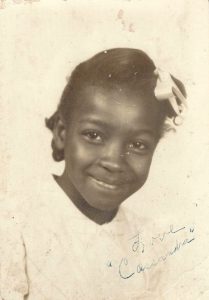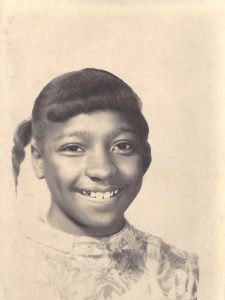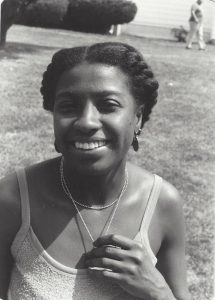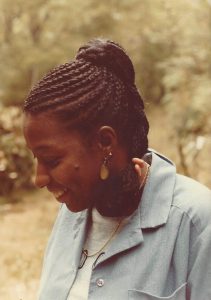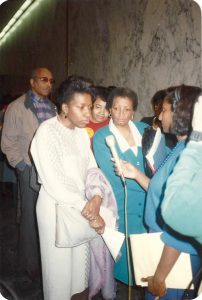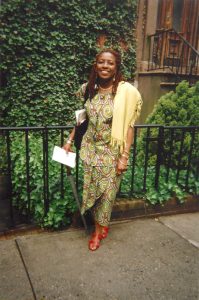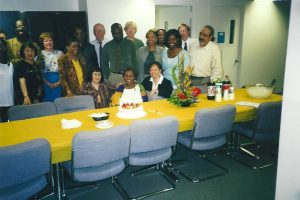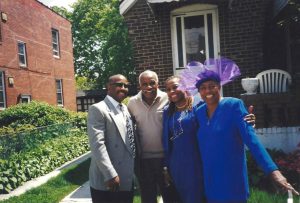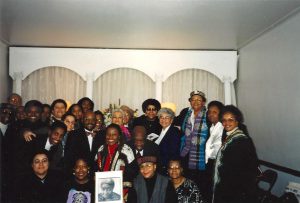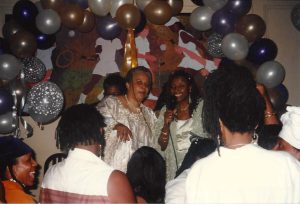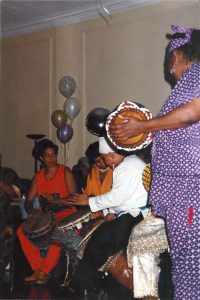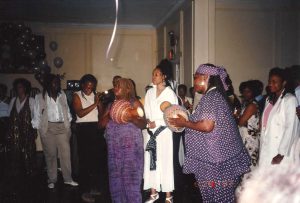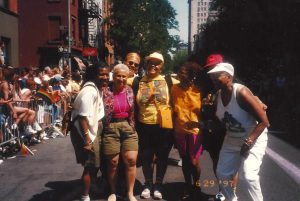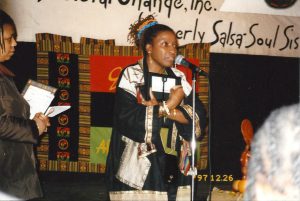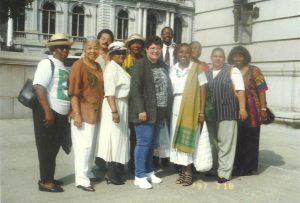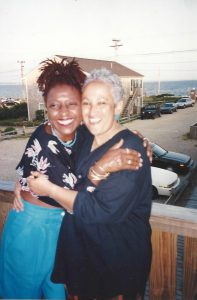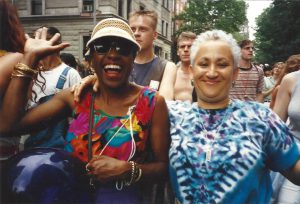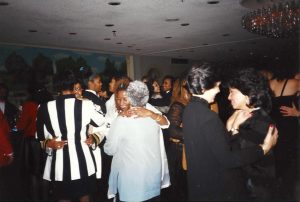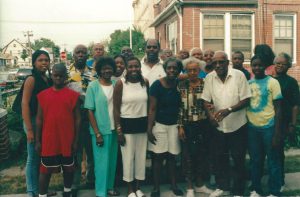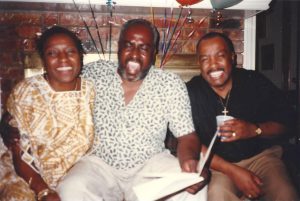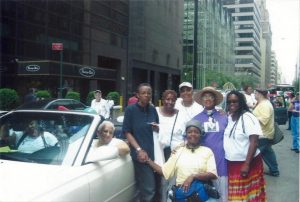A school portrait of Cassandra at age 5-6. Photo courtesy of Cassandra Grant.
A school portrait of Cassandra at age 9-10. Photo courtesy of Cassandra Grant.
A portrait of Cassandra at age 30-35 in upstate New York, 1980s. Photo courtesy of Cassandra Grant.
Cassandra on a staff field trip, 1981. Photo courtesy of Cassandra Grant.
Cassandra with the New York City Daycare Directors and Union, Albany, NY. Photo courtesy of Cassandra Grant.
Cassandra on her way to work. Photo courtesy of Cassandra Grant.
Cassandra and the New York State Education Department staff celebrating her birthday, New York, NY, 1993. Photo courtesy of Cassandra Grant.
Cassandra Grant, her father Joe, her brother Terry, and her mother Val Grant celebrating Val’s birthday outside of their family home, Queens, NYC. Photo courtesy of Cassandra Grant.
Cassandra Grant, the Salsa Soul Sisters, and friends at Luvenia Pinson (Cassandra’s first serious partner)’s memorial, December 1996. Photo courtesy of Cassandra Grant.
Harriet Alston, Cassandra Grant, the Salsa Soul Sisters, and family friends at Cassandra’s 50th birthday celebration, New York, NY, July 1997. Photo courtesy of Cassandra Grant.
The drummers for Cassandra’s 50th birthday celebration, New York, NY, July 1997. Photo courtesy of Cassandra Grant.
Harriet Alston, Cassandra Grant, and the Salsa Soul Sisters at Cassandra’s 50th birthday celebration, Oxford Tennis Club, New York, NY, July 1997. Photo courtesy of Cassandra Grant.
The Salsa Soul Sisters at the Gay Pride March, New York NY, June 29th, 1997. Photo courtesy of Cassandra Grant.
Cassandra at the annual Kwanzaa celebration, December 29, 1997. Photo courtesy of Cassandra Grant.
Cassandra with parents from New York City at the New York State Regents Meeting, New York, NY, 1997 or 1998. Photo courtesy of Cassandra Grant.
Cassandra Grant and her wife Sharon Lucas with the Salsa Soul Sisters, Provincetown, MA. Photo courtesy of Cassandra Grant.
Cassandra Grant and her wife Sharon Lucas at the Gay Pride March, New York, NY, June 1999. Photo courtesy of Cassandra Grant.
Cassandra Grant and her wife Sharon Lucas at a New Year’s Eve party. Photo courtesy of Cassandra Grant.
The Grand and Martin families gather outside of Cassandra’s family home after her mother Val Grant’s passing, Queens, NYC, July 2002. Photo courtesy of Cassandra Grant.
Cassandra and her brothers Joe and Terry at Joe’s 60th birthday, Dallas, TX. Photo courtesy of Cassandra Grant.
The Salsa Soul Sisters at the Gay Pride March, New York, NY, June 2009. Photo courtesy of Cassandra Grant.
Cassandra Grant was born in 1947 in New York City. Her family lived in the Lincoln Projects in Harlem, a haven for Black World War II veterans who were routinely denied better housing options available to White vets. The neighborhood was tightknit. To this day, Cassandra maintains friendships with kids she grew up with.
Cassandra’s parents were from Georgetown, South Carolina. When Cassandra went to South Carolina to visit her grandparents, she crashed up against the more overt racism still dominant there. Things like marching up to the front of the movie theater to buy a ticket—and being told she had to go to the back door. Things like hopping onto the rope swing in front of the general store—and getting called the N-word by the store owner. At age 73, Cassandra still feels the sting of those encounters.
One of Cassandra’s grandmothers was a teacher, and from early on, Cassandra set her sights on becoming an early childhood educator. In college, she grew her hair out and got yelled at by her mother. A semester later, however, she came home and found her mom had an Afro, too. The times were changing—but one topic remained off limits: sexuality. Neither Cassandra nor her mom knew how to talk about it. Cassandra had some boyfriends, but in college, she fell in love with a woman named Luvenia Pinson. Inspired by the Rev. Dolores Jackson and poet Audre Lord, Cassandra, Luvenia and others formed Salsa Soul Sisters Third World Project to support Black and Latina women and other women of color who loved women. The Salsa Soul Sisters met every Thursday night for protest, advocacy, and fun—but when they went to Greenwich Village bars like Bonnie and Clyde’s and The Duchess, they met with the same racism, a bit more slickly packaged, that Cassandra had experienced in the Deep South. Things like getting asked for multiple forms of ID, while White girls didn’t even get carded. The Sisters stuck together, fought together, and loved together. Today, they’re the oldest Black lesbian collective in the United States.
Throughout all the years of the Salsa Soul Sisters, Cassandra also pursued and accomplished a rich career as a teacher, administrator, and activist, working tirelessly to improve early childhood education at the city, county, and state level. Looking back today at the sexism, racism, classism, and homophobia she’s encountered and dealt with in her lifetime, Cassandra says, “We dealt with them in an honest way and a truthful way, in the best way we knew how. When Salsa women get together, we just give each other big hugs.”

